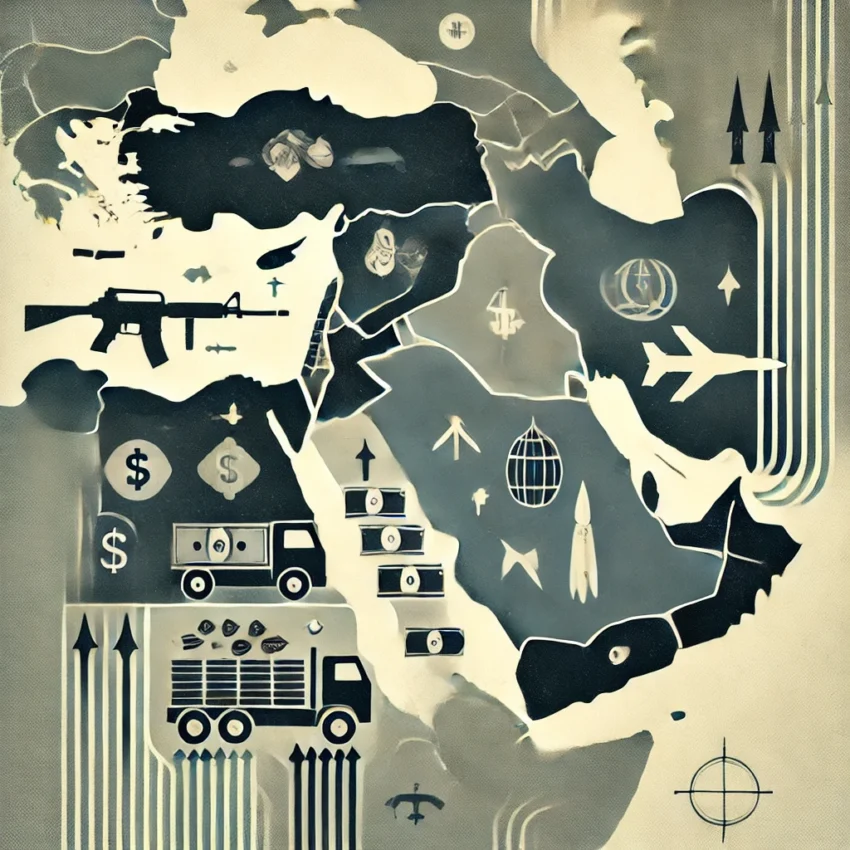Hezbollah, a Shiite militant group and political party based in Lebanon, has developed a comprehensive network to sustain its military and political activities. This article examines Hezbollah’s formidable weapons arsenal, its involvement in drug smuggling and money laundering, and its relationships with key international players, including Iran, Israel, and other countries.
Weapons Arsenal
Hezbollah’s military capabilities have significantly evolved since its formation, primarily due to substantial support from Iran and logistical aid from Syria.
- Rocket and Missile Capabilities: Hezbollah possesses an extensive range of rockets and missiles, making it one of the most well-armed non-state actors globally. The arsenal includes:
- Fajr-3 and Fajr-5 Rockets: These Iranian-provided rockets have ranges that can reach major Israeli cities.
- Zelzal-2 and Fateh-110 Missiles: These longer-range missiles allow Hezbollah to target areas deep within Israeli territory with precision, posing a substantial threat to Israel’s security.
- Anti-Aircraft and Anti-Ship Missiles: The group has acquired anti-aircraft systems and anti-ship missiles, including the C-802, enhancing its ability to challenge Israeli air and naval supremacy.
- Conventional Weapons and UAVs: Hezbollah’s arsenal includes a variety of small arms, artillery, and advanced anti-tank guided missiles (ATGMs) like the Kornet. Additionally, it has developed UAV capabilities for reconnaissance and potential offensive operations, often with technology supplied by Iran.
Illicit Operations: Drug Smuggling and Money Laundering
To finance its operations, Hezbollah engages in extensive illicit activities, including drug trafficking and money laundering.
- Global Drug Trafficking: Hezbollah operates a sophisticated global drug trafficking network, involved in the production and distribution of narcotics, particularly cocaine and heroin. This network extends across South America, Africa, and Europe, providing a significant revenue stream.
- Tri-Border Area Activities: In the Tri-Border Area of Argentina, Brazil, and Paraguay, Hezbollah has established a strong presence, leveraging the region’s lax law enforcement to facilitate drug trafficking and money laundering operations.
- Money Laundering and Front Companies: Hezbollah launders the proceeds from its illicit activities through a network of front companies and sympathizers. These operations disguise illegal earnings as legitimate business income, which is then channeled back into the organization’s military and social services.
- International Countermeasures: Efforts by the international community, including sanctions and law enforcement actions, aim to disrupt Hezbollah’s illicit operations. Despite these efforts, the group’s extensive and well-hidden network continues to pose a significant challenge to global security.
Relationships with Key Countries
Hezbollah’s relationships with various countries significantly influence its operational capabilities and regional impact.
- Iran: Iran is Hezbollah’s most important ally and benefactor, providing financial support, military training, and advanced weaponry. This relationship is rooted in shared ideological and strategic interests, with Iran using Hezbollah as a proxy to extend its influence in the region.
- Syria: Syria has been a crucial ally, providing logistical support and serving as a conduit for Iranian weapons to Hezbollah. During the Syrian Civil War, Hezbollah’s active military support for the Assad regime further cemented the alliance between these entities.
- Lebanon: In Lebanon, Hezbollah operates as a political party and a paramilitary force, wielding significant influence. It provides social services and maintains a large armed wing, often acting independently of the Lebanese state, which has led to tensions within Lebanon’s political landscape.
- Israel: Hezbollah maintains a state of hostility with Israel, frequently engaging in armed skirmishes and posing a constant threat with its extensive rocket and missile arsenal. The 2006 Lebanon War was a notable conflict between the two, highlighting Hezbollah’s military strength and Israel’s vulnerability to asymmetrical warfare.
- Other International Relations:
- Venezuela and Cuba: Hezbollah has cultivated relationships with these countries, often involving shared opposition to U.S. influence and cooperation in illicit activities.
- Russia: While not a formal ally, Russia and Hezbollah have occasionally aligned interests, particularly in supporting the Assad regime in Syria.
- China: China maintains a pragmatic relationship with Iran and, by extension, Hezbollah, primarily in economic and diplomatic arenas, though not actively supporting Hezbollah’s military activities.
Conclusion
Hezbollah’s comprehensive arsenal and its involvement in drug smuggling and money laundering underpin its operational capabilities and sustain its extensive activities in Lebanon and beyond. The group’s robust relationships with Iran and Syria provide critical support, enabling it to challenge Israel and influence regional dynamics. Meanwhile, its global illicit networks highlight Hezbollah’s reach and adaptability, complicating international efforts to curb its activities. As Hezbollah continues to navigate complex international relationships and maintain its military strength, it remains a central player in Middle Eastern geopolitics and a significant concern for global security.
Andrea Bodei
EUCIF
The European Cyber Intelligence Foundation is a European non-profit think tank specializing in intelligence and cybersecurity, offering consultancy services to government entities

